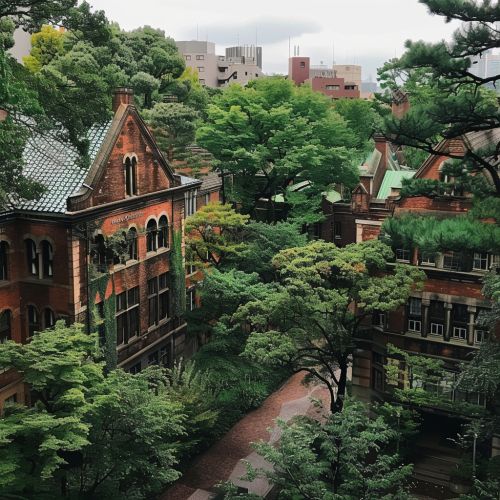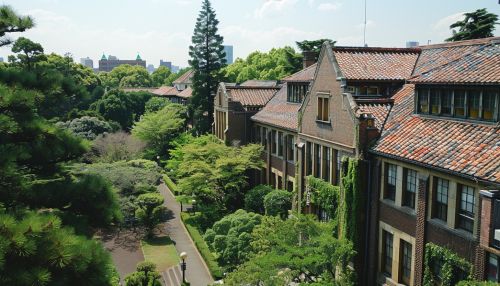University of Tokyo
History
The University of Tokyo (東京大学, Tōkyō Daigaku), abbreviated as Todai (東大), was established in 1877 as the first imperial university in Japan. It was initially founded by merging the Tokyo Kaisei School and the Tokyo Medical School. The university has since grown to become one of the most prestigious institutions of higher education in Japan and globally. The University of Tokyo has played a significant role in Japan's modernization and has produced numerous notable alumni, including Nobel laureates, prime ministers, and leaders in various fields.
Campuses
The University of Tokyo comprises three main campuses: Hongo, Komaba, and Kashiwa.
Hongo Campus
The Hongo campus is the university's main campus and houses the majority of its faculties and administrative offices. It is located in Bunkyo, Tokyo, and is known for its historic buildings, including the iconic Akamon (Red Gate) and Yasuda Auditorium. The Hongo campus is also home to the university's central library, which holds an extensive collection of academic resources.


Komaba Campus
The Komaba campus is situated in Meguro, Tokyo, and primarily serves the College of Arts and Sciences. It is where most undergraduate students spend their first two years before moving to their respective faculties at the Hongo campus. The Komaba campus is known for its modern facilities and vibrant student life.
Kashiwa Campus
The Kashiwa campus, located in Kashiwa, Chiba Prefecture, focuses on advanced research and graduate education. It houses several research institutes and centers, including the Institute for Cosmic Ray Research and the Kavli Institute for the Physics and Mathematics of the Universe.
Academic Structure
The University of Tokyo is organized into ten faculties and fifteen graduate schools, covering a wide range of disciplines.
Faculties
- Faculty of Law
- Faculty of Medicine
- Faculty of Engineering
- Faculty of Letters
- Faculty of Science
- Faculty of Agriculture
- Faculty of Economics
- Faculty of Arts and Sciences
- Faculty of Education
- Faculty of Pharmaceutical Sciences
Graduate Schools
- Graduate School of Humanities and Sociology
- Graduate School of Education
- Graduate School of Law and Politics
- Graduate School of Economics
- Graduate School of Arts and Sciences
- Graduate School of Science
- Graduate School of Engineering
- Graduate School of Agricultural and Life Sciences
- Graduate School of Medicine
- Graduate School of Pharmaceutical Sciences
- Graduate School of Mathematical Sciences
- Graduate School of Frontier Sciences
- Graduate School of Information Science and Technology
- Graduate School of Interdisciplinary Information Studies
- Graduate School of Public Policy
Research Institutes and Centers
The University of Tokyo is renowned for its research output and houses numerous research institutes and centers.
Institute of Medical Science
The Institute of Medical Science (IMSUT) is a leading research institute dedicated to medical and life sciences. It focuses on areas such as cancer research, infectious diseases, and regenerative medicine.
Earthquake Research Institute
The Earthquake Research Institute (ERI) is a world-renowned center for seismology and earthquake engineering. It conducts cutting-edge research on earthquake prediction, seismic hazard assessment, and disaster mitigation.
Institute for Cosmic Ray Research
The Institute for Cosmic Ray Research (ICRR) is dedicated to the study of cosmic rays and high-energy astrophysics. It operates several large-scale observatories, including the Super-Kamiokande neutrino detector.
Kavli Institute for the Physics and Mathematics of the Universe
The Kavli Institute for the Physics and Mathematics of the Universe (Kavli IPMU) is an interdisciplinary research institute that aims to address fundamental questions about the universe. It brings together researchers from physics, mathematics, and astronomy.
Notable Alumni
The University of Tokyo has produced numerous notable alumni who have made significant contributions to various fields.
Politics
- Yukio Hatoyama, former Prime Minister of Japan
- Kiichi Miyazawa, former Prime Minister of Japan
- Junichiro Koizumi, former Prime Minister of Japan
Science and Technology
- Hideki Yukawa, Nobel laureate in Physics
- Leo Esaki, Nobel laureate in Physics
- Shinya Yamanaka, Nobel laureate in Physiology or Medicine
Literature
- Yasunari Kawabata, Nobel laureate in Literature
- Kenzaburo Oe, Nobel laureate in Literature
International Collaboration
The University of Tokyo actively collaborates with leading universities and research institutions worldwide. It is a member of the Association of Pacific Rim Universities and the International Alliance of Research Universities. The university also participates in various exchange programs and joint research projects to promote global academic cooperation.
Admissions
Admission to the University of Tokyo is highly competitive. The university conducts rigorous entrance examinations for both undergraduate and graduate programs. The undergraduate admission process includes the National Center Test for University Admissions and the university's own secondary examination. For graduate programs, applicants are required to pass written and oral examinations specific to their chosen field of study.
Libraries and Museums
The University of Tokyo boasts an extensive network of libraries and museums that support its academic and research activities.
General Library
The General Library, located on the Hongo campus, is the university's central library. It holds a vast collection of books, journals, and electronic resources across various disciplines. The library also provides access to rare manuscripts and historical documents.
University Museum
The University Museum is dedicated to preserving and showcasing the university's rich history and cultural heritage. It houses a diverse collection of artifacts, including archaeological finds, scientific instruments, and art pieces.
Student Life
The University of Tokyo offers a vibrant student life with numerous extracurricular activities and student organizations.
Clubs and Societies
The university has a wide range of clubs and societies catering to various interests, including sports, arts, culture, and academics. These organizations provide students with opportunities to pursue their passions and develop leadership skills.
Housing
The University of Tokyo provides several housing options for students, including dormitories and apartments. The university's housing facilities are designed to support students' academic and personal development.
